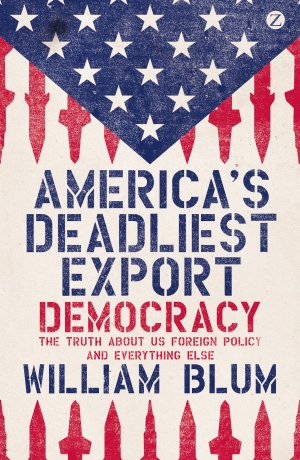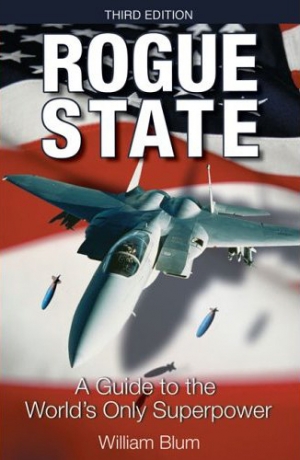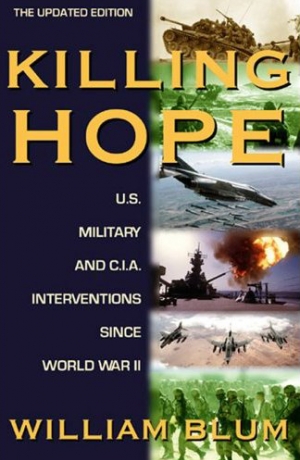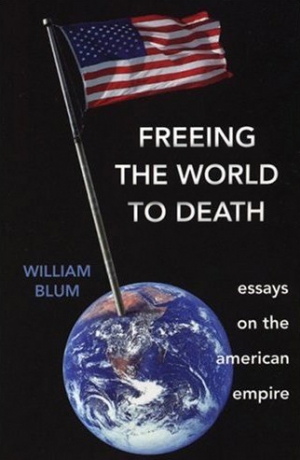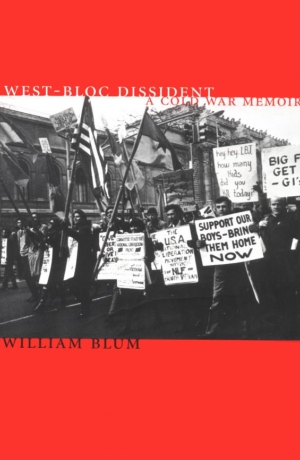Hiroshima: Last military act of World War II or first act of the Cold War?
By William Blum
Written in 1995 for the upcoming 50th anniversary of the dropping of the atomic bombs on Japan.
Does winning World War II and the Cold War mean never having to say you’re sorry? The Germans have apologized to the Jews and to the Poles. The Japanese have apologized to the Chinese and the Koreans, and to the United States for failing to break off diplomatic relations before attacking Pearl Harbor. The Russians have apologized to the Poles for atrocities committed against civilians, and to the Japanese for abuse of prisoners. The Soviet Communist Party even apologized for foreign policy errors that “heightened tension with the West”. 1
Is there any reason for the United States to apologize to Japan for atomizing Hiroshima and Nagasaki?
Those on opposing sides of this question are lining up in battle formation for the 50th anniversary of the dropping of the atom bombs on August 6 and 9, 1945. During last year’s heated controversy surrounding the Smithsonian Institution’s exhibit on the Enola Gay, the B-29 that dropped the atom bomb on Hiroshima, US veterans went ballistic. They condemned the emphasis on the ghastly deaths caused by the bomb and the lingering aftereffects of radiation, and took offense at the portrayal of Japanese civilians as blameless victims. An Air Force group said vets were “feeling nuked”. 2
In Japan, too, the anniversary has rekindled controversy. The mayors of the two Japanese cities in question spoke out about a wide “perception gap” between the two countries. 3 Nagasaki Mayor Hitoshi Motoshima, surmounting a cultural distaste for offending, called the bombings “one of the two great crimes against humanity in the 20th Century, along with the Holocaust”. 4
Defenders of the US action counter that the bomb actually saved lives: It ended the war sooner and obviated the need for a land invasion. Estimates of the hypothetical saved-body count, however, which range from 20,000 to 1.2 million, owe more to political agendas than to objective projections. 5
But in any event, defining the issue as a choice between the A-bomb and a land invasion is an irrelevant and wholly false dichotomy. By 1945, Japan’s entire military and industrial machine was grinding to a halt as the resources needed to wage war were all but eradicated. The navy and air force had been destroyed ship by ship, plane by plane, with no possibility of replacement. When, in the spring of 1945, the island nation’s lifeline to oil was severed, the war was over except for the fighting. By June, Gen. Curtis LeMay, in charge of the air attacks, was complaining that after months of terrible firebombing, there was nothing left of Japanese cities for his bombers but “garbage can targets”. By July, US planes could fly over Japan without resistance and bomb as much and as long as they pleased. Japan could no longer defend itself. 6
After the war, the world learned what US leaders had known by early 1945: Japan was militarily defeated long before Hiroshima. It had been trying for months, if not for years, to surrender; and the US had consistently ignored these overtures. A May 5 cable, intercepted and decoded by the US, dispelled any possible doubt that the Japanese were eager to sue for peace. Sent to Berlin by the German ambassador in Tokyo, after he talked to a ranking Japanese naval officer, it read:
Since the situation is clearly recognized to be hopeless, large sections of the Japanese armed forces would not regard with disfavor an American request for capitulation even if the terms were hard. 7
As far as is known, Washington did nothing to pursue this opening. Later that month, Secretary of War Henry L. Stimson almost capriciously dismissed three separate high-level recommendations from within the Truman administration (Roosevelt had just died) to activate peace negotiations. The proposals advocated signaling Japan that the US was willing to consider the all-important retention of the emperor system; i.e., the US would not insist upon “unconditional surrender”. 8
Stimson, like other high US officials, did not really care in principle whether or not the emperor was retained. The term “unconditional surrender” was always a propaganda measure; wars are always ended with some kind of conditions. To some extent the insistence was a domestic consideration – not wanting to appear to “appease” the Japanese. More important, however, it reflected a desire that the Japanese not surrender before the bomb could be used. One of the few people who had been aware of the Manhattan Project from the beginning, Stimson had come to think of it as his bomb – “my secret”, as he called it in his diary. 9 On June 6, he told President Truman he was “fearful” that before the A-bombs were ready to be delivered, the Air Force would have Japan so “bombed out” that the new weapon “would not have a fair background to show its strength”. 10 In his later memoirs, Stimson admitted that “no effort was made, and none was seriously considered, to achieve surrender merely in order not to have to use the bomb”. 11
Meeting at Potsdam
And to be successful, that effort could have been minimal. In July, before the leaders of the US, Great Britain, and the Soviet Union met at Potsdam, the Japanese government sent several radio messages to its ambassador, Naotake Sato, in Moscow, asking him to request Soviet help in mediating a peace settlement. “His Majesty is extremely anxious to terminate the war as soon as possible”, said one communication. “Should, however, the United States and Great Britain insist on unconditional surrender, Japan would be forced to fight to the bitter end.” 12
On July 25, while the Potsdam meeting was taking place, Japan instructed Sato to keep meeting with Russian Foreign Minister Molotov to impress the Russians “with the sincerity of our desire to end the war [and] have them understand that we are trying to end hostilities by asking for very reasonable terms in order to secure and maintain our national existence and honor” (a reference to retention of Emperor Hirohito). 13
Having broken the Japanese code years earlier, Washington did not have to wait to be informed by the Soviets of these peace overtures; it knew immediately, and did nothing. Indeed, the National Archives in Washington contains US government documents reporting similarly ill-fated Japanese peace overtures as far back as 1943. 14
Thus, it was with full knowledge that Japan was frantically trying to end the war, that President Truman and his hardline Secretary of State, James Byrnes, included the term “unconditional surrender” in the July 26 Potsdam Declaration. This “final warning” and expression of surrender terms to Japan was in any case a charade. The day before it was issued, Harry Truman had approved the order to release a 15 kiloton atomic bomb over the city of Hiroshima. 15
Many US military officials were less than enthusiastic about the demand for unconditional surrender or use of the atomic bomb. At the time of Potsdam, Gen. Hap Arnold asserted that conventional bombing could end the war. Adm. Ernest King believed a naval blockade alone would starve the Japanese into submission. Gen. Douglas MacArthur, convinced that retaining the emperor was vital to an orderly transition to peace, was appalled at the demand for unconditional surrender. Adm. William Leahy concurred. Refusal to keep the emperor “would result only in making the Japanese desperate and thereby increase our casualty lists,” he argued, adding that a nearly defeated Japan might stop fighting if unconditional surrender were dropped as a demand. At a loss for a military explanation for use of the bomb, Leahy believed that the decision “was clearly a political one”, reached perhaps “because of the vast sums that had been spent on the project”. 16 Finally, we have Gen. Dwight Eisenhower’s account of a conversation with Stimson in which he told the secretary of war that:
Japan was already defeated and that dropping the bomb was completely unnecessary. … I thought our country should avoid shocking world opinion by the use of a weapon whose employment was, I thought, no longer mandatory as a measure to save American lives. It was my belief that Japan was, at that very moment, seeking some way to surrender with a minimum loss of “face”. The secretary was deeply perturbed by my attitude, almost angrily refuting the reasons I gave for my quick conclusions. 17
If, as appears to be the case, the US decision to drop the A-bombs was based on neither the pursuit of the earliest possible peace nor it being the only way to avoid a land invasion, we must look elsewhere for the explanation.
Target Soviet Union
It has been asserted that dropping of the atomic bombs was not so much the last military act of the Second World War as the first act of the Cold War. Although Japan was targeted, theweapons were aimed straight to the red heart of the USSR. For more than 70 years, the determining element of US foreign policy, virtually its sine qua non, has been “the communist factor”. World War II and a battlefield alliance with the Soviet Union did not bring about an ideological change in the anti-communists who owned and ran America. It merely provided a partial breather in a struggle that had begun with the US invasion of Russia in 1918. 18 It is hardly surprising then, that 25 years later, as the Soviets were sustaining the highest casualties of any nation in World War II, the US systematically kept them in the dark about the A-bomb project, while sharing information with the British.
According to Manhattan Project scientist Leo Szilard, Secretary of State Byrnes had said that the bomb’s biggest benefit was not its effect on Japan but its power to “make Russia more manageable in Europe”. 19
General Leslie Groves, Director of the Manhattan Project, testified in 1954: “There was never, from about two weeks from the time I took charge of this Project, any illusion on my part but that Russia was our enemy, and that the Project was conducted on that basis.” 20
The United States was thinking post-war. A Venezuelan diplomat reported to his government after a May 1945 meeting that Assistant Secretary of State Nelson Rockefeller “communicated to us the anxiety of the United States Government about the Russian attitude”. US officials, he said, were “beginning to speak of Communism as they once spoke of Nazism and are invoking continental solidarity and hemispheric defense against it”. 21
Churchill, who had known about the weapon before Truman, understood its use: “Here then was a speedy end to the Second World War,” he said about the bomb, and added, thinking of Russian advances into Europe, “and perhaps to much else besides. … We now had something in our hands which would redress the balance with the Russians.” 21
Referring to the immediate aftermath of Nagasaki, Stimson wrote of what came to be known as “atomic diplomacy”:
In the State Department there developed a tendency to think of the bomb as a diplomatic weapon. Outraged by constant evidence of Russian perfidy, some of the men in charge of foreign policy were eager to carry the bomb for a while as their ace-in-the-hole. … American statesmen were eager for their country to browbeat the Russians with the bomb held rather ostentatiously on our hip. 23
“The psychological effect on Stalin [of the bombs] was twofold,” observed historian Charles L. Mee, Jr. “The Americans had not only used a doomsday machine; they had used it when, as Stalin knew, it was not militarily necessary. It was this last chilling fact that doubtless made the greatest impression on the Russians.” 15
After the Enola Gay released its cargo on Hiroshima on August 6, common sense – common decency wouldn’t apply here – would have dictated a pause long enough to allow Japanese officials to travel to the city, confirm the extent of the destruction, and respond before the US dropped a second bomb.
At 11 o’clock in the morning of August 9, Prime Minister Kintaro Suzuki addressed the Japanese Cabinet: “Under the present circumstances I have concluded that our only alternative is to accept the Potsdam Proclamation and terminate the war.” Moments later, the second bomb fell on Nagasaki. 25 Some hundreds of thousands of Japanese civilians died in the two attacks; many more suffered terrible injury and permanent genetic damage.
After the war, His Majesty the Emperor still sat on his throne, and the gentlemen who ran the United States had absolutely no problem with this. They never had.
The United States Strategic Bombing Survey of 1946 concluded:
It seems clear that, even without the atomic bombing attacks, air supremacy over Japan could have exerted sufficient pressure to bring about unconditional surrender and obviate the need for invasion. Based on a detailed investigation of all the facts, and supported by the testimony of the surviving Japanese leaders involved, it is the Survey’s opinion that certainly prior to 31 December 1945, and in all probability prior to 1 November 1945, Japan would have surrendered even if the atomic bombs had not been dropped, even if Russia had not entered the war, and even if no invasion had been planned or contemplated. 26
It has been argued, to the present day, that it wouldn’t have mattered if the United States had responded to the Japanese peace overtures because the emperor was merely a puppet of the military, and the military would never have surrendered without the use of the A-bombs. However, “the emperor as puppet” thesis was a creation out of whole cloth by General MacArthur, the military governor of Japan, to justify his personal wish that the emperor not be tried as a war criminal along with many other Japanese officials. 27
In any event, this does not, and can not, excuse the United States government for not at least trying what was, from humanity’s point of view, the clearly preferable option, replying seriously to the Japanese peace overtures. No matter how much power the military leaders had, the civil forces plainly had the power to put forth the overtures and their position could only have been enhanced by a positive American response.
Notes
- Los Angeles Times, June 26, 1988, p.8
- Ibid., August 3, 1994
- Ibid., March 16, 1995, p.1
- Ibid.
- In June and July 1945, Joint Chiefs of Staff committees predicted that between 20,000 and 46,000 Americans would die in the one or two invasions for which they had drawn contingency plans. While still in office, President Truman usually placed the number at about a quarter of a million, but by 1955 had doubled it to half a million. Winston Churchill said the attacks had spared well over 1.2 million Allies. (Barton Bernstein, “The Myth of Lives Saved by A-bombs,” Los Angeles Times, July 28, 1985, IV, p.1; Barton Bernstein, “Stimson, Conant, and Their Allies Explain the Decision to Use the Atomic Bomb,” Diplomatic History, Winter 1993, p.48.)
- Stewart Udall, The Myths of August (New York, 1994), pp.73, 75; Martin S. Quigley, Peace Without Hiroshima (Lanham, MD, 1991), pp.105-6; Charles L. Mee, Jr., Meeting at Potsdam (New York, 1975), p.76
- Tim Weiner, “US Spied on its World War II Allies,” New York Times, August 11, 1993, p.9
- Udall, pp.73-79
- Ibid., p. 73. Vice President Truman was never informed about the bomb. After Roosevelt’s death, when he assumed office, it was Secretary of State James Byrnes who briefed him on the project. (Henry L. Stimson and McGeorge Bundy, On Active Service in Peace and War (New York, 1947). Bundy is recognized as the principal author of these Stimson memoirs.
- Udall, p.76
- Stimson, p.629
- Mee, p.23
- Ibid., pp.235-6; See also: Hearings Before the Committee on Armed Services and the Committee on Foreign Relations (US Senate), June 25, 1951, p.3113, for reference to another peace overture.
- Los Angeles Times, January 9, 1995, p.5
- Mee, p.239
- Ibid., pp.75, 78-9; and William Manchester, American Caesar: Douglas MacArthur 1880-1964 (Boston, 1978), p.437
- Dwight Eisenhower, The White House Years: Mandate for Change, 1953-1956 (New York, 1963), pp.312-3
- In an attempt, as Churchill said, to “strangle at its birth” the infant Bolshevik state, the US launched tens of thousands of troops and sustained 5,000 casualties.
- Mee, p.22
- “In the Matter of J. Robert Oppenheimer”, Transcript of Hearing Before Personnel Security Board, Washington, DC, April 12, 1954 to May 6, 1954 (Washington, DC 1954), p.173
- Weiner, op. cit.
- Weiner, op. cit.
- Bernstein, Diplomatic History, pp.66-8. This passage, actually written by Bundy for “On Active Service”, was deleted from that book because of pressure from State Department official George F. Kennan.
- Mee, p.239
- Ibid., pp.288-9
- United States Strategic Bombing Survey (Pacific War), 1 July 1946, p.26
- Edward Behr, Hirohito: Beyond the Myth (New York, 1989), chapter 24; The Guardian (London), June 18, 1983
